
International students contribute up to 5 billion euros to the French economy
Campus France worked with Kantar Public institute to conduct a survey with 10,000 international students to better understand their resources, spending and living conditions. The study assesses the economic impact of their presence in France: their contribution amounts to 5 billion euros for the country, i.e. a net positive balance of 1.35 billion euros taking into account related public expenditure. The survey also provides information about the positive long-term impact on France’s international image.
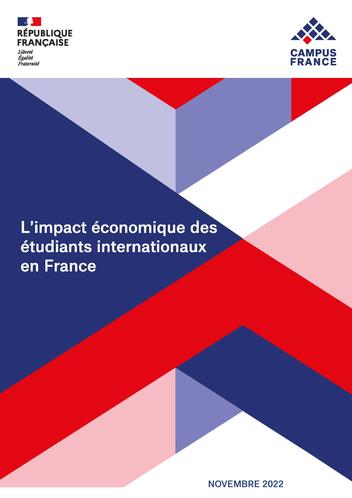
Une enquête de grande ampleur
Entre février et avril 2022, un sondage d’une cinquantaine de questions a été diffusé auprès de 9 992 étudiants internationaux ayant séjourné en France au cours des trois dernières années.
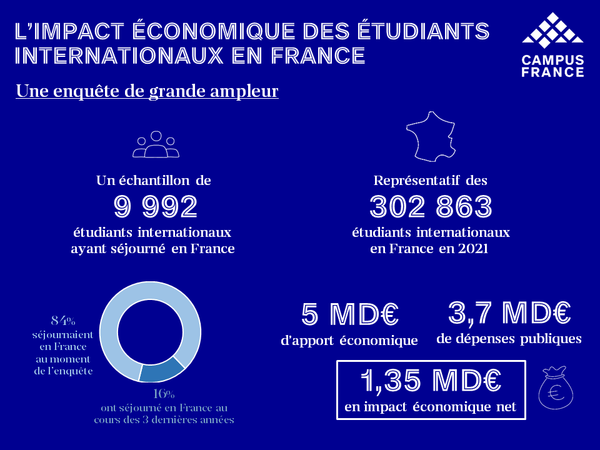
Cet échantillon est rendu représentatif des 302 863 étudiants internationaux en France via un redressement statistique, appliqué sur quatre critères déterminants : l’origine géographique de l’étudiant, le type d’établissement supérieur fréquenté, le niveau d’études, et le bénéfice de bourses du gouvernement français.
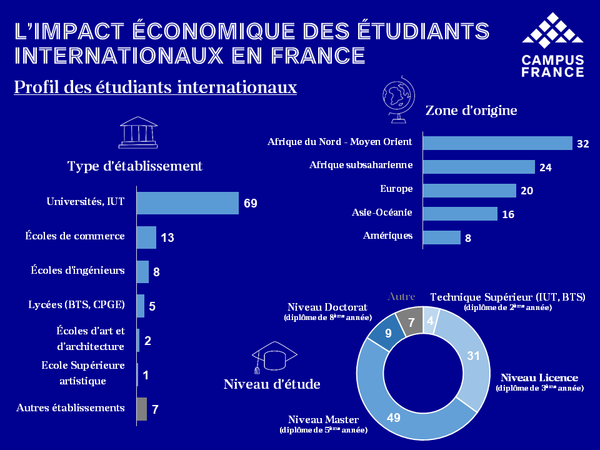
Comment les étudiants internationaux financent-ils leurs études ?
L’enquête identifie cinq sources principales de financement : l’entourage familial est de loin la source de financement du séjour d’études la plus souvent citée (77%) et représente 53% des revenus dépensés. Les économies personnelles, viennent ensuite (48%). En troisième place, les aides de la CAF (46%), puis les activités rémunérées (job étudiant, 34%). Enfin, 18% des répondants déclarent financer leurs études grâce à des bourses d’études octroyées par les gouvernements de leurs pays d’origine ou par le gouvernement français. 48% des étudiants ont travaillé pendant leur séjour d’études. Pour plus de la moitié d’entre eux, ces emplois sont jugés indispensables pour faire face à leurs dépenses.
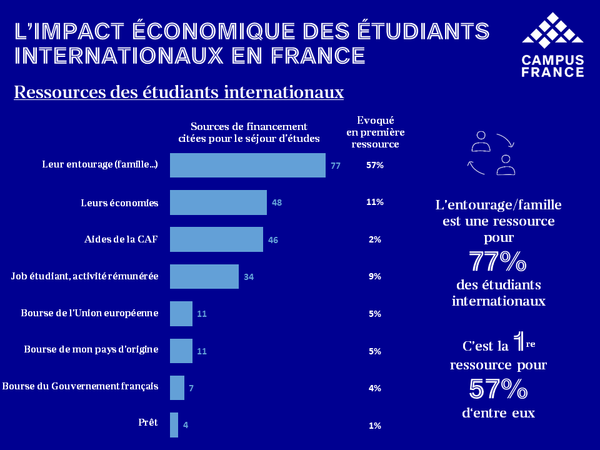
L’impact de la crise du Covid-19
Si, dans la majorité des cas, la crise sanitaire n’a pas eu d’impact sur la durée du séjour (78%), elle a engendré des dépenses imprévues pour 60% d’entre eux (frais de vie quotidienne, aller-retours avec le pays d’origine, santé). La crise a notamment eu un impact négatif sur les sources de revenus de 62% des étudiants, et dans une moindre mesure sur l’aide apportée par les familles, qui a baissé dans 31% des cas. Pour 60% des étudiants, la crise sanitaire a empêché les proches des étudiants de leur rendre visite en France.
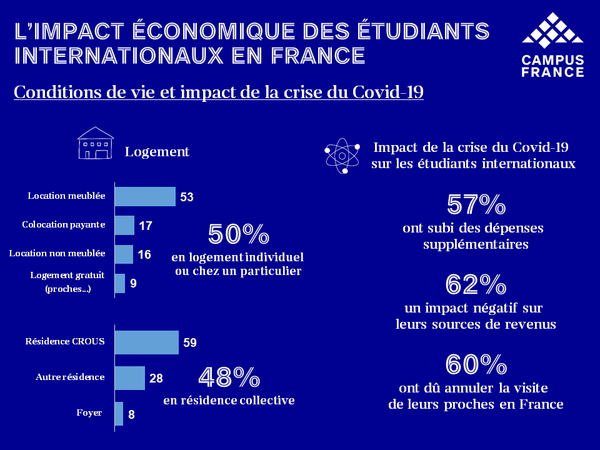
5 milliards d’euros d’apport financier lié à la présence des étudiants internationaux en France
En moyenne les étudiants internationaux dépensent 867 euros par mois : 48% de ce budget est destiné au loyer, 21% aux frais de vie quotidienne (vêtements, alimentation). D’après les résultats de l’enquête, ils s’acquittent en moyenne de 2822 euros de frais de scolarité (CVEC incluse).
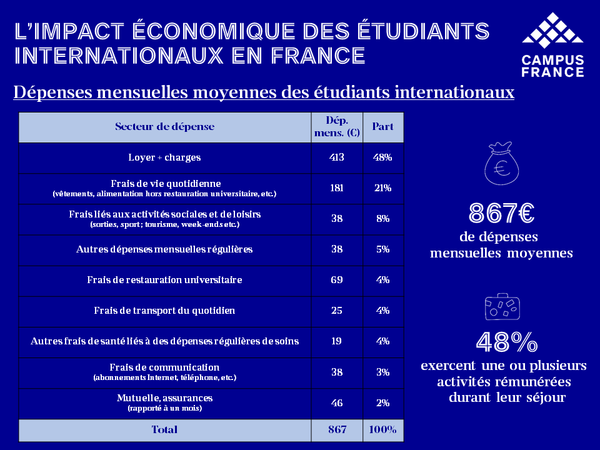
Leur séjour génère également des recettes pour l’économie française dans une grande diversité de secteurs :
-
L’enquête montre que 38% des répondants ont reçu la visite de proches pendant leur séjour (famille et/ou amis), et lorsque c’est le cas, pour une durée totale moyenne de 23 jours
-
1 692 euros sont dépensés en moyenne en transports ferroviaires, aériens et routiers (hors transports du quotidien) pour se rendre en France.
-
Un quart des répondants a suivi des cours de français avant ou pendant le séjour en France, à 58% dans des institutions françaises, pour un coût moyen de 1 632 euros.
-
20% des répondants ont indiqué avoir effectué plusieurs emplois en France pendant leur séjour d’études, et 28% un seul emploi. Cela représente un apport en cotisations sociales salariales qui se monte respectivement à 13 300€ et 7 800€ en moyenne.
-
Pour les étudiants concernés par ces procédures, les frais de dossier Etudes en France, d’obtention des visas et titres de séjour représentent 34,8 millions d’euros d’apport annuel.
Au total, en additionnant l’ensemble des recettes sur la période, les plus de 300 000 étudiants internationaux apportent 5 milliards d’euros à l’économie française.
Des dépenses publiques inférieures aux recettes : un apport net de 1,35 millard d’euros
Plusieurs types de dépenses publiques sont destinées aux étudiants internationaux sur une année donnée :
-
La part de la dépense intérieure d’enseignement pour le niveau supérieur imputable aux étudiants internationaux : 3,1 milliards d’euros. – Annexe 4.
-
Le montant annuel total des bourses du gouvernement français pour les étudiants internationaux : 53 millions d’euros.
-
Le montant des aides au logement bénéficiant aux étudiants internationaux : 206,6 millions d’euros ;
-
Les dépenses de sécurité sociale imputables aux étudiants internationaux : 247,2 millions d’euros ;
-
Le coût des services de l’Etat (Campus France et services diplomatiques) destinés à la venue d’étudiants internationaux en France et à la diplomatie culturelle et d’influence : 86,9 millions d’euros.
En soustrayant l’ensemble des dépenses aux recettes, un apport net de 1,35 milliard d’euros est mis en évidence : c’est l’impact économique direct des étudiants internationaux en France.
Rayonnement de la France
Au-delà du bénéfice économique immédiat pour l’économie française, l’enquête permet d’évaluer l’impact à long terme de la présence des étudiants internationaux pour l’image de la France à l’international.
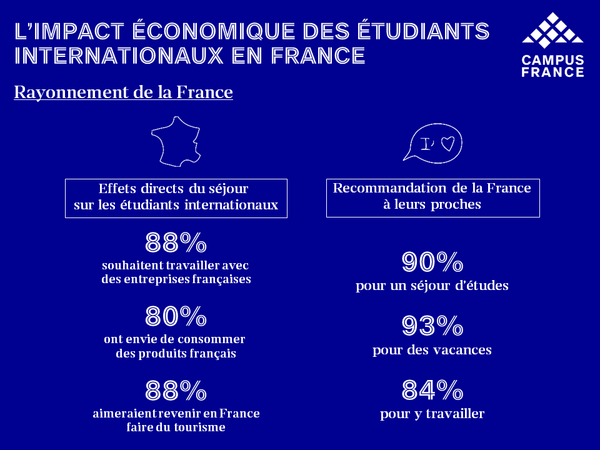
Selon les répondants, ce séjour en France a des effets positifs directs sur le souhait de travailler avec des entreprises françaises (88% des répondants), de consommer des produits français (80%), ou l’envie de revenir en France faire du tourisme (88%). Les étudiants internationaux seront également les premiers prescripteurs du pays, en recommandant la France comme destination de travail (84%), de vacances (93%), de séjour pour les études (90%), ou bien pour y vivre (75%).
Related contents
Recommended News




















































